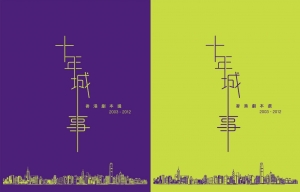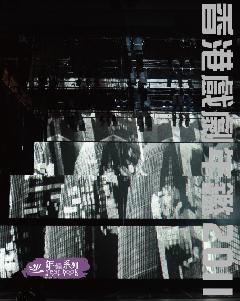For me one of the most memorable performances of the highly successful Thirty Third Hong Kong International Arts Festival, which has not long concluded to general approbation, was a piece of burlesque, irreverent and politically topical storytelling narrated by a one-man-band of an entertainer from Italy at the Studio Theatre of the Cultural Centre. The Festival offered some exceptional fare this year, but I stand by my choice, partly out of personal taste and experience, and partly to right a critical wrong, as I perceive it. Italian Nobel prize winner Dario Fo’s satirical swipe at the White Anglo Saxon Protestant view of the world as currently purveyed by George Bush and his string-pullers in the United States, is a timely piece of theatrical iconoclasm, ridiculing as it does the white supremacy ideology inherent in the Columbus and the Discovery of America myth. It is not, as a number of critics have pointed out, everyone’s cup of tea, exactly.
Indeed, for such a potentially alienating theme to be appreciated by audiences in Hong Kong, well-informed as they may be about world affairs, the one-man band in question has to give a virtuoso performance, or the audience will start to drift away after the first hour of the two hour monologue. In the irrepressible Mario Pirovano Fo has found the perfect interpreter for his farcical historical critique. Hong Kong people, for so long staunch believers in the Yankee mythology of personal freedom, and sometimes blind to the fact that these loudly proclaimed freedoms have almost always impinged on other people’s freedom and rights, are beginning to look with a more observant and sceptical eye on the recent deeds of the world’s only superpower. Whilst some Hong Kong critics who reviewed the show were aware that Pirovano’s antics in a gamut of roles as storyteller (the eponymous Padan) and a host of other characters from sailors to indigenous people were intended as a satire on western imperialism, they were less appreciative of the crude physical humour and coarse jokes employed by the performer. The point was made that instead of undermining the discourses of imperialism, Fo’s play and Pirovano’s performance served to reinforce them, inasmuch as Padan is depicted as a saviour and champion of the indigenous people of Florida in their resistance to the Conquistadors. Far from subverting the forces of colonialism Padan simply represents an alternative paternalist white face.
Hong Kong’s recently ended experience of western colonialism has perhaps heightened the sensitivity of local commentators to what might perceived as politically incorrect statements or representations of this theme. Fo’s play, and Pirovano’s bravura performance of his dramatic monologue, were, in keeping with the theme of the Festival itself, sacred and profane in their references. The Catholic Church and the Inquisition, the Columbus mythology, and all the grand narratives of western hegemony (still enshrined in the creed of latter-day imperialists), all were lampooned and thoroughly debunked. The historically accurate renegades, those who deserted and went native, have, as Fo’s work so powerfully affirms, their own tale to tell. Unfortunately, it isn’t a politically correct tale, any more than Peter Shaeffer’s great play about the subjugation of the Inca people, The Royal Hunt of the Sun, told a politically correct, (i.e. simplistic and utopian) tale. Fo’s play is a tribute to their courage in adversity and their spirit of resistance to the officially sanctioned atrocities committed by their fellow Europeans.
Pirovano’s commedia del arte-influenced storytelling style is pure burlesque, with a heavy emphasis on ludicrous impersonation. It follows the Swiftian and Voltarian technique of picaresque storytelling by an ‘ingenuous’, i.e. a naïve and hapless innocent, to increase the comic effect and indicate the sheer absurdity of the enterprise. Perhaps we shall be reading and listening to accounts of Bush’s and Blair’s Iraq ‘adventure’ by deserters and renegades delivered in similarly comic style in the years ahead.
Whilst I certainly don’t presume to lecture other Hong Kong critics on what they should like or how they should review performances, I would like to suggest that we need to pay attention to the reaction of the audience, which in the case of Johan Padan and the Discovery of America was overwhelmingly positive. We also need to be aware of as many factors as possible that should inform the performance reception, rather than giving undue weight to one or two of them. The infamous critical reception of the Royal Shakespeare Company’s masterpiece production of Nicholas Nickleby in 1980 is a case in point, taken from my own viewing experience. It was simply perverse and grossly misleading to dismiss the production as off-handedly as most of the critics did.
I believe that Johan Padan was a much more positively received production than was reflected by, certainly, the Hong Kong English language press. Pirovano’s own English language delivery, as has been pointed out by the show’s detractors, whilst idiosyncratic and heavily, but of course appropriately, accented, was remarkably fluent. It hit the comic mark unerringly and together with his delightfully expressive body language, which managed to convey everything from a hurricane to a wild horse, created a palpable chemistry with an entranced audience. Some of the comical difficulties of cross-cultural translation actually helped to break any initial ice, as opposed to creating barriers to comprehension. Having said that it is clear that comedy, that is both linguistic and physical, as this is, can at times be difficult to translate just as it is for a foreign audience to decode. In that sense any non-Italian audience, European or Asian, is foreign. It is not just a matter of a perceived East-West polarity.
Ultimately, it must be healthy for theatre criticism in Hong Kong and anywhere else, come to that, to be engaged in sometimes fierce debate about performance. Perhaps Fo is a stage equivalent to Michael Moore, in that the public tends to either love or hate him depending on their politics. Fo is unlikely to be the Vatican’s prime candidate for the Papal vacancy any time soon, whilst Moore’s robust and quizzically ironic style has made him as much as a hate figure with conservative American right-wingers as it has an unlikely darling of the progressive left. However, we need to remember that the Arts Festival is an international event, and that we need to engage with it both critically and sympathetically in an attempt to appreciate the diverse perspectives of the various art forms. I may be wrong, of course, in my own assessment and unsophisticated in my taste in the view of some other critics. However, I feel it is important to do my critical best to correct possible misconceptions about Fo’s timely play (not to mention his richly evocative backdrop paintings) and Pirovano’s virtuoso Hong Kong performance of the piece. In the process we may spark a greater debate about the place of arts criticism in the coming era of cultural apotheosis, symbolized by the Grand West Kowloon Cultural Project!
本網站內一切內容之版權均屬國際演藝評論家協會(香港分會)及原作者所有,未經本會及/或原作者書面同意,不得轉載。








